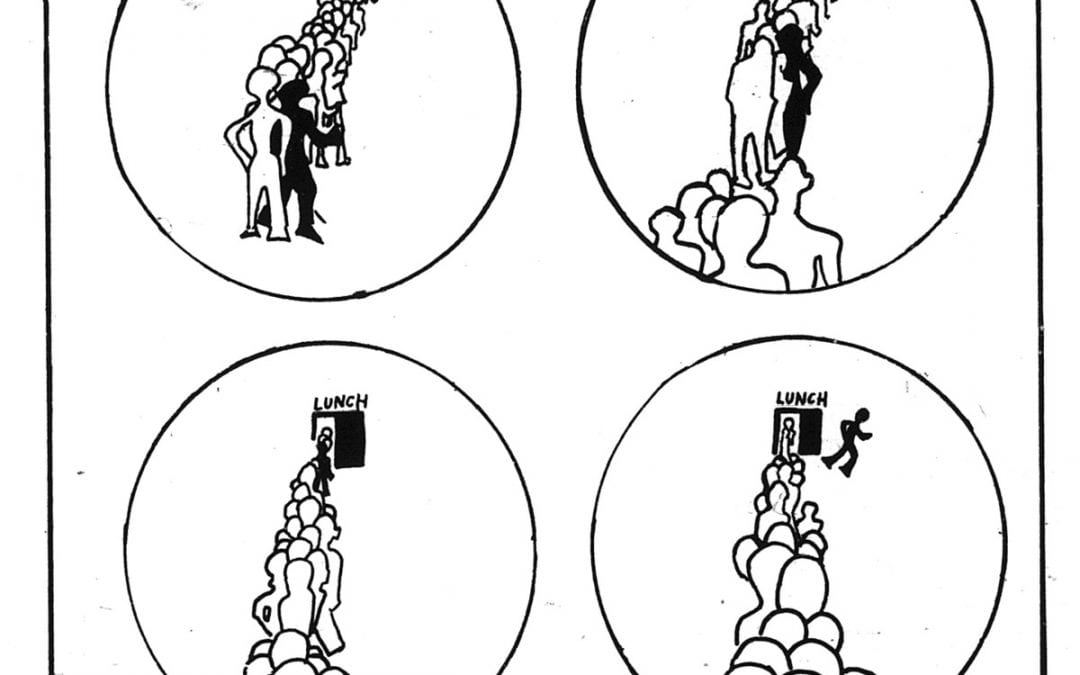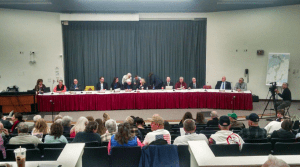
Oct 13, 2020 | Feature |
Taking a look back at the past 90 years of our campus newspaper and highlighting noteworthy items that perhaps were best forgotten.
I think many of you will find this comic published in the Mirror in the fall of 1970 very relatable. 
It’s 11:35 and you just got out of a boring lecture. You join the quickly lengthening line to get into the dining hall. After waiting for what seems like forever, it’s finally your turn to say good morning (again) to Eloise and swipe your card. Suddenly you realize you can’t find that card and remember that you left it back in your dorm.
You then take the walk of shame away from the lunch line and back to your dorm, which you can’t get into because you don’t have your ID. Then starts the process of calling friends to let you in, or trying to sneak in behind someone else entering the building (and try not to look too suspicious). Hopefully by the time you finally get your ID, you still have enough time to eat before your next obligation.
We’ve all been there and, if you somehow haven’t been, I assure you that you soon will be.
May 3, 2019 | News |
Milo Fitzgerald, Contributing Writer
In the wake of clashes with the administration this semester, the College Democrats have dissolved as a student organization, in protest of what one club member deemed as “censoring a club’s right to discuss a political topic.” This follows the series of Bangor Daily News (BDN) articles about the handling of sexual assault cases by UMF staff and administration.
Prior to the BDN articles published earlier this year, an individual messaged former Secretary Hope Lash, senior, on Facebook in what she said was an “extremely disrespectful” and “inappropriate” manner. Lash, at the time on a May 2018 travel course, had never spoken to the individual before and declined his advances, then blocked him on her personal Facebook account.
Sometime following the first BDN article, the individual reported to Student Senate that he was blocked from accessing the public College Democrats Facebook page. This accusation was not verified by the Senate before action was taken. In fact, it became clear that the individual was not blocked from the Facebook page, because he had sent messages to the page asking for meeting times. Because the College Democrats generally did not get much activity on the Facebook page, they were not checking the page very often.
However, the individual reported the accusation to a member of the Senate, who directed the case to Student Life. The College Democrats were told by Marie Prevost, Graduate Area Coordinator for Student Life and their own club advisor, that the club would become defunct if they did not allow the individual to come to club meetings. After Lash discovered the messages sent to the Facebook page, Prevost declined to take any action and told her to take her complaint to Brian Ufford, Director of Student Life.
“There were many in the club uncomfortable around the person,” former President of the College Democrats, Jeffrey Willey, senior, said in an email interview.
Dominic Stevens, former Treasurer, admitted that the individual had an “unsettling demeanor.”
However, Willey added, “I told them that, due to University policy, we could not prevent the person from attending.” Because students are required to pay an activity fee, unless there is a legal restraining order, a student cannot be prevented from joining any club.
The College Democrats planned their next meeting, which took place directly before the first Campus Violence Prevention Coalition panel on Wednesday, Feb. 6, wanting to discuss a range of topics, from budget hearings and the State of the Union Address to the Women’s March and “the importance of solidarity as well as unity when it comes to sexual assault,” Lash said in her personal statement to Brian Ufford. “Given the current events which have been unfolding for weeks on this campus, as well as the situation we had seemingly been placed in we felt we had a responsibility to those who attend our meetings to educate, protect, and discuss with members sexual assault and violence.”
By discussing the topic at large, Lash continued, the goal was to “solidify where we as a group stood on the subject, making it clear to all those who attend our meetings that the College Democrats support victims in these cases, and will continue to listen to the voices of men and women who speak out in courage against their assaulters.”
However, Lash and the other members were not allowed to speak about the topic of sexual assault during their meeting. Fifteen minutes before the meeting began, Lash reported, Brian Ufford pulled aside Willey for a private conversation. During this conversation, Ufford informed him that Title IX action would be brought against the club, which would result in its dissolution, if the College Democrats were to keep speaking out against the current sexual assault issues.
“I realized quickly during our meeting Wednesday,” Lash said in her personal statement, “that Student Life cared more for censoring a club’s right to discuss a political topic as all conversation regarding sexual assault was avoided with the exception of a comment I had made when the CVPC forum was brought up, to which I was promptly interrupted by Miss Prevost who essentially told me to be quiet.”
After realizing that she had no other option, Lash announced that she was resigning as the College Democrats’ Secretary. By that Friday, the rest of the E-board had joined her.
“I refuse to be party to the confusion and injustice that the administration has caused as a result of the misuse of power when Title IX is involved,” Lash said. “I’d rather there be no club at all, than put members’ safety and comfort at risk.”
Following the Wednesday meeting, Lash and the other members were contacted by Robert Pederson, President’s Council member and Director of Center for Student Development, on behalf of Interim President Eric Brown, asking for in person meetings or email statements about the dissolution of the College Democrats. “Eric Brown told him to get to the bottom of things,” said Stevens, who met with Pederson in person. Lash reported that she sent her email statement on Feb. 19, and has still not received a response from either Pederson or Brown.
“I want people to understand how admin, particularly Student Life, sees and treats students,” Lash said in her personal statement. “We are tired of the neglect, we are tired of the lack of transparency, and most of all we are tired of being unheard. If UMF is to succeed it must listen to our voices and concerns with kindness, as well as respect.”
Willey also voiced concern for the future. “While I will not be here next semester, I still do care about our University and those that will attend after myself, and I would not want this to ever happen to anyone again,” Willey wrote in an email interview.
Hope Shore, Assistant Director of Student Life and Deputy Title IX Coordinator, declined to comment on the situation, as well as Prevost. Amie Parker, Director of Human Resources, did not respond to an email inquiry, and Brian Ufford did not respond to multiple email inquiries.
Section 402, the UMaine System (UMS) interpretation of Title IX, states that all UMaine universities “will not tolerate sex discrimination, sexual harassment, sexual assault, dating violence, domestic violence, stalking, or retaliation in any form. All conduct of this nature is considered a violation of this policy.” Retaliation is defined as “intimidating, threatening, coercing, or in any way discriminating against an individual because of the individual’s complaint or participation.” Furthermore, UMF’s Student Conduct Code states that retaliation is an “action taken by the University or any individual or group against any person for opposing any practices prohibited by the Code or for filing a complaint, testifying, assisting, or participating in an investigation or proceeding under the Code.” As stated, the College Democrats took no action to prevent the individual from accessing the Facebook page or attending the meetings. There is nothing in either of these official documents that would indicate a violation by the College Democrats.

Apr 19, 2019 | Feature |
By Darby Murnane & Emily Mokler Assistant Editor & Editor-in-Chief

The public forums provided a platform for discussion about the CMP powerline. (Photo by Emily Mokler)
Maine’s Department of Environmental Protection (DEP) hosted a week-long collection of hearings and two public forums on the UMF campus to address the proposed Central Maine Power (CMP) transmission line during the first week of April. This project, the New England Clean Energy Connect (NECEC), has been met with controversy from Maine residents as both those for and against the project have voiced concern over how the state’s actions will impact the course of climate change.
The transmission, according to The Portland Press Herald, will run 145 miles from the Canadian border just north of route 27 to Lewiston, ME, and approximately 50-55 miles of this would be newly constructed lines, the remaining distance consisting of existing lines that would be widened by 75-150 feet. Electricity generated by Quebec Hydropower would be carried to Massachusetts via the NECEC to aid MA. in meeting state green-energy standards. The transmission line is set to run directly through Farmington.
Many Mainers came forward during the public forums on April 2 and 4 to argue in favor of the line and implored the DEP panel members to take timely and productive steps to reduce greenhouse gas emissions. Speakers often cited the estimated 12 years the world has to take proactive steps in reversing climate change before it is too late.
The project is also meant to provide economic benefits to Mainers as workers will be needed for construction. Matt Marks, CEO of Associated General Contractors of Maine (ACG) spoke at the April 6 forum on behalf of his company to argue for the NECEC job opportunities, stating that AGC had lost 10,000 workers in recent recessions. “More than 5200 megawatts of oil, coal, and nuclear power plants will be retired from from 2013-2022. And another 5000 megawatts of coal and oil fire generation could retire in a couple years,” Marks said. “We need to replace these plants and 1200 megawatts of clean, reliable hydropower delivered to Lewiston, maine will be the region’s largest source of electricity from clean energy.”
Conversely, those speaking against the NECEC expressed fear that environmental damage and greenhouse gas emitted by the construction of the line will outweigh the proposed benefits. As an estimated 50-55 miles of land would be cleared to make way for the transmission line, environmentalist opponents argue that the deforestation and carbon dioxide (CO2) released from clear-cut vegetation essentially cancels out what CO2 is meant to be eliminated by the NECEC.
Tom Saviello, a former Maine Senator, also spoke at the April 6 forum, adding to the environmental debate with his expertise in forestry, having earned a Phd in Forest Resources from University of Maine. “One tree can absorb as much carbon a year that a car produces while driving 26,000 miles. Over the course of a life, a single tree can absorb one ton of carbon dioxide,” Saviello said. “So if we take the 55 miles of the corridor, that’s 150 feet wide and the rest 70 feet wide, we’ll cut a lot of trees which will equate to about 800,000 pounds of car carbon emissions.”
There was some discrepancy among speakers about how many trees would actually be cut as many in favor of the line argued that the supposedly pristine wilderness through which the line would run is already crossed by access roads, as well as stretches of working forests such as logging ground. Yet those against the line noted that logged forests are able to regrow, whereas land home to transmissions line are routinely sprayed with herbicides to keep vegetation at bay.
As Saviello testified before the DEP panel, he also commented on Maine’s legal responsibility in addressing climate via environmental law, stating, “We set goals for Maine, not New England. So I do suggest this part of the law should be addressed as part of the site location permit for [NECEC] can be issued.”

Oct 11, 2018 | Feature |
By Aislinn Forbes Contributing Writer
The wood creaked under Brock Bubar’s feet as he entered Alumni Theater through the dark hallway that circles around the seating, having arrived a half an hour before rehearsal starts. Bubar stretches, bending in half or standing on one foot, while he studies his script. “You know, just to go over lines,”

Jonas Maines as main character, Christopher. (Photo by Steffon Gales)
Bubar said, chuckling good naturedly. “There’s a couple lines I always mess up so I have to look at them over and over again.”
Hope Lash, the stage manager, is also there early. Lash is small in stature, but has clear focus and command of a room. Lash has a lot of responsibilities before the actors arrive and after they leave. “My job basically involves knowing everything that happens during a production,” Lash said. As the stage manager, Lash is responsible for communication between the various departments; lights, sound, props, costumes, actors, director.
“Stage managers have such value in the rehearsal and performance process because there is a point where the play moves from the director’s hands to the stage manager’s,” Director Jayne Decker wrote in an email. “Hope worked with me on last year’s production of “Hamlet”, and I’m so glad she is back for our current play.”
Lash’s experience with Hamlet has prepared her well for “A Curious Case of a Dog in the Night-time”. “It’s smaller, it’s a lot smaller.” Lash said, relieved, “The cast is only 10 people, in “Hamlet” there was 22.”
Both Lash and Bubar remarked that the experience developing A Curious Case of a Dog in the Night-time has been rewarding because of the many new faces. “I think about half the cast is incoming students,” Lash’s voice dropped with sincerity, “and they’ve been amazing to work with too, and getting to know them.”
Bubar enthusiastically stated, “That’s one of the best parts about the theater, getting to know everyone you work with.”
The nature of the play and the size of the cast causes most of the actors to play more than one role. Bubar has to portray five separate characters, with two different accents. In order to make costume changes faster between characters, “Everyone has a base of black,” explained Bubar. “And the other stuff is like decoration on top.”
According to Lash, this fits well with the design of the set, “the colors are very muted.”
Decker wrote that she chose the play in order to challenge the actors. “There is great physical work for many of them, including fight choreography and stylized movement.” However, the actor only represent a fraction of the people needed to make the production work.
“One of the great joys in directing a play like Curious Incident is the opportunity to collaborate with scenic and lighting artist, Stan Spilecki,” Decker said, “and sound designer, Michael Diffin because the technical elements establish context for the play.”
Stan Spilecki, in an email interview, described the concept behind the set design. He took the personality of the main character into account when designing the setting, which he calls non-realistic. “Christopher is a mathematics prodigy who needs to order his life,” Spilecki said. “This brings thoughts of order and chaos and thus a version of the Rubik’s Cube.”
Costumes and props are handled by students. Declan Attaway-Murphey and Samantha Wood are responsible for the costume design, the two of them spend hours in the basement of the theater searching through boxes of clothes for things that fit both the show and the actors.
Senior Jessica Leibowitz designs, crafts and organizes the props. “Jess has been working on something all summer,” said Bubar mysteriously. “I haven’t been allowed to see it.”
“A Curious Case of a Dog in the Night-time” opens on Thur., Oct. 18th and will play through Sun., Oct 21st. To purchase tickets students will need to call the UMF box office at (207) 778-7465. Tickets are $5 for students.



